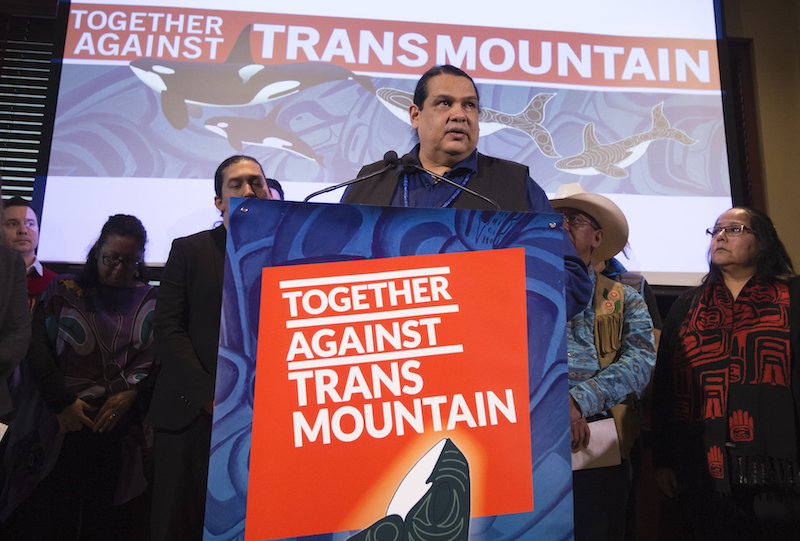Opinion
A worthwhile journey
The Coastal GasLink process was needlessly divisive
By: Niigaan Sinclair
Posted: 03/2/2020 3:00 AM

It didn’t have to be this way.
After four days of meetings between Wet’suwet’en hereditary chiefs, Minister of Crown-Indigenous Relations Carolyn Bennett and British Columbia Indigenous Relations Minister Scott Fraser, an agreement appears to be reached to acknowledge Wet’suwet’en traditional leaders as rights holders over their territory.
The dispute over the Coastal GasLink pipeline isn’t over by any means — the majority of the Wet’suwet’en hereditary chiefs still oppose the project and the agreement must be presented to their nation — but this is the first step to reconcile what had become a national stalemate between traditional Indigenous peoples and the Canadian state.
The implications of Canada and B.C. recognizing a traditional Indigenous government are enormous. This not only ratifies the 1997 Supreme Court Delgamuukw decision (which also determined the Wet’suwet’en hold title over 22,000 square kilometres of territory) but opens the doorway for First Nations traditional forms of government — virtually gutting one of the most central tenets of the Indian Act: the Chief and Council system.
Now, Canada and B.C. must invite the Wet’suwet’en hereditary chiefs to treaty negotiations over land. The future role of the Wet’suwet’en Indian Act chiefs and councils — most of whom signed “benefit agreements” to receive money and jobs as a result of the pipeline — is now uncertain.
In fact, the future of the Indian Act may be in doubt too. For decades, consecutive federal governments have promised to remove the 148 year-old legislation intended to assimilate “Indians” into Canada. Now, pressure will be on as some First Nations may refuse to govern themselves according to the chief and council model. This, above the pipeline project itself, may be the lasting legacy of Sunday’s agreement.
Recognizing Indigenous traditional governments also represents an ironic moment where Canada and B.C. will follow the “rule of law.” Not only did the Supreme Court recognize Wet’suwet’en hereditary chiefs in 1997 but last November the province of BC unanimously adopted the United Nations Declaration on the Rights of Indigenous Peoples via Bill 41, “The Declaration on the Rights of Indigenous Peoples Act.”
If B.C. follows through on implementing the Declaration, they must reconcile that Indigenous peoples “have the right to self-determination” (Article 3), “have the right to autonomy or self-government” (Article 4), and “the right to maintain and strengthen their distinct political, legal, economic, social, and cultural institutions, while retaining their right to participate fully, if they so choose, in the political, economic, social, and cultural life of the State” (Article 5).
In this, Wet’suwet’en hereditary chiefs may have shown Canada what reconciliation could look like.
The immediate question though is what’s this mean for the Coastal GasLink pipeline? The agreement doesn’t address that question directly and Coastal GasLink announced Sunday “construction will resume.”
Well Canada’s “duty to consult” under section 35 of the constitution is fulfilled, this will end in the courts.
This could be found through B.C.’s Bill 41, which directs the provincial government to appoint a member of the B.C. cabinet to “negotiate and enter into an agreement with an Indigenous governing body” over any use of Indigenous lands and resources, with the purpose to obtain “the consent of the Indigenous governing body before the exercise of a statutory power of decision.”
These negotiations could even include Indian Act chiefs and councils — appeasing political opponents and even some Wet’suwet’en who believe in them — but this will take time, energy, and resources. This may be exactly what Canada, B.C., and the Wet’suwet’en need — as cooler and calmer airs will likely be found.
Time, however, may be up for the Coastal GasLink’s $6.6-billion 670-kilometre pipeline project (190 kilometres cross Wet’suwet’en territory).
The cost of building the project is already exponentially increasing and if an alternative route is agreed upon this will add hundreds of millions more. Meanwhile, the price of oil and gas is dropping (especially with the coronavirus), the pipeline will consume a huge share of B.C.’s carbon budget, and fracking for gas and the burning of fossil fuels are lacking wide-scale public support.
Soon, the only argument for the pipeline will be within the subsidies, grants, and commitments Canada gives to the corporate sector — who will, in the end, choose profits over the jobs and money the project promises.
Sunday’s agreement may have come from discord, blockades, and a loss of investment but may result in a new relationship with Indigenous nations, the law being followed, and long-term savings due to the cancellation of an unsustainable project with much fewer benefits than advertised.
The journey may be worthwhile but the path was divisive — and it didn’t need to be.
niigaan.sinclair@freepress.mb.ca



/arc-anglerfish-tgam-prod-tgam.s3.amazonaws.com/public/JQPQC25JN5ENNNTKBW4N2PRMVQ.jpg)







